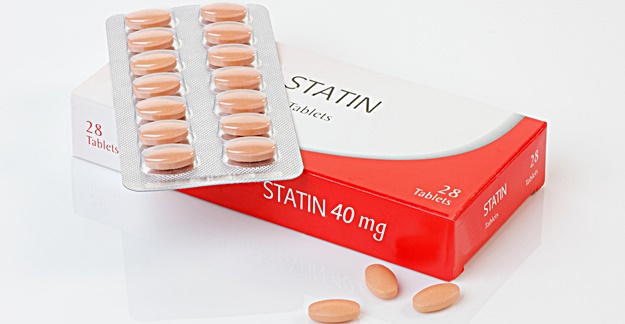Statin drugs that lower cholesterol and reduce the risk of heart attacks and strokes are among the most-prescribed drugs in the U.S.
About 28% of people aged 40 and over take one. That number rises to 50% of people aged 75 and over.
The evidence is overwhelming that statins work: They lower the risk of having a heart attack or stroke by an average of around 30%. And statins are credited — along with lifestyle and diet changes — with reducing the premature death rate from cardiovascular disease by 45% between 2000 and 2013. That translates into millions of lives saved and prolonged.
But amidst this medical success story, researchers continue to fiercely debate who should take a statin, and whether statins are, or aren’t, being overprescribed to people at low risk of a heart attack or stroke.
Since the late 1980s, public health and heart disease groups have issued a series of recommendations based on the ever-evolving evidence and data that surround statins. That, in turn, has primary care doctors constantly adapting to changing treatment guidelines for their patients.
The main concern: starting people on a drug they may have to take for their rest of their lives even as the long-term benefits and side effects are still being quantified.
The latest guidelines rely on your overall risk of a heart attack or stroke in the next 10 years — as determined by a variety of risk factors, and not just your cholesterol level. Those risks include your age, blood pressure level, whether you smoke, are overweight, or have diabetes or other medical problems.
Importantly, the new guidelines added between 8 million and 13 million more people aged 40 to 75 to the projection of those “needing” a statin. That brought the total to almost half the people in that age range.
Consumer Reports has tracked the statin debate and the treatment guidelines closely over the past 12 years in the context of its Best Buy Drug Project — a public information initiative. In February, Consumer Reports issued an updated report on statins. It’s based primarily on recent guidelines from the U.S. Preventive Services Task Force. It’s also informed by guidelines from the American College of Cardiology and the American Heart Association.
In addition, this MedShadow article is based on reporting I did for Consumer Reports on the use of statins by people under age 20 and those over age 75. Debate about statin use by people in both age groups has recently heated up.
Here’s what you need to know now about the 7 statin medications available:
- Unless you have a bad reaction or side effects after taking a statin, you should absolutely take one if — 1) you’ve previously had a heart attack or stroke; 2) been diagnosed with coronary artery disease or atherosclerosis; 3) had a heart artery blockage; or 4) had either angioplasty or bypass surgery.
- The above advice applies to people of any age. (The prevalence of coronary artery disease ranges from 1% in 18- to 44-year-olds to 7% in people aged 45 to 64, and 20 percent in those aged 65 and older.)
- You should take a statin if you have a hereditary condition called familial hypercholesterolemia (FH), which is characterized by having very high LDL cholesterol levels. About 1 in 250 adults in the U.S. have FH, but it can occur in childhood, too.
- If you’ve not had a heart attack or stroke, do not have FH, and are 40 or over, take 5 minutes to use an online tool to calculate your risk of having a heart attack or stroke. The calculators are simple and easy, but you’ll need your latest cholesterol blood test results and systolic (the upper number) blood pressure reading.
The results are given as a percentage risk over 10 years. There are several calculators online; Consumer Reports recommends this one, developed by the American College of Cardiology.
- If you are between 40 and 75 years old and your score is less than 7.5%, your doctor is not likely to recommend a statin, unless your LDL cholesterol level is very high (190 or above) or there are other extenuating circumstances (such as a family history of early heart disease).
- If you’re between 40 and 75 years old and your risk is 10% or greater on the calculator, you should consider taking a statin. See your doctor soon.
- If you’re between 40 and 75 years old and your risk is between 7.5% and 9.9%, statins might lower your risk of a heart attack or stroke, but fewer people in this group will benefit from treatment because there is a lower risk of having a cardiovascular event to begin with.
- People in this age group and at this level of risk should try lifestyle changes first, including quitting smoking, losing excess weight, getting adequate exercise, consuming a heart-healthy diet, and drinking alcohol in moderation.
A 2016 analysis in the New England Journal of Medicine found that a healthy lifestyle can cut the risk of a heart attack or other coronary event by a third, even among people with a family history of the disease.
Overall, men aged 40 to 59 have a 3 in 100 risk over 10 years of a heart attack. For those with risk factors and/or high LDL cholesterol, that risk rises to around 5 to 7 in 100. For men aged 60 to 79, the 10-year risk of heart attack quadruples to 12 in 100 even if they don’t have risk factors. And the risk can rise to as high as 1 in 4 or 1 in 3 for those with multiple risk factors. Women of all ages are at lower risk of heart attack, but it doubles between those age ranges.
- The latest advice is less clear-cut for people 76 years and older who have no history of cardiovascular disease or events — but who may score above 10% using a risk calculator.
The problem is that the U.S. Preventive Services Task Force (USPSTF) found insufficient evidence to make firm recommendations. Sadly, the main reason is that most of the studies conducted over the last 20 years failed to include enough people aged 75 and over.
In practice, however, most cardiologists apply the same rules as for 40- to 75-year-olds.
“The physiology and biology do not change once you hit 76,” says Steven Nissen, MD, head of cardiology at the Cleveland Clinic. “And there’s no evidence indicating the benefits [of statins] are not the same for older people.”
Roger Chou, MD, a professor of medicine at Oregon Health & Science University who led the team that conducted the analysis of statin studies for the task force, concurs: “It’s reasonable to assume the reduction in risk would be the same,” he told me.
- Both doctors agree that people 76 and over might be more vulnerable to the side effects of statins (see below), but there’s not conclusive evidence on this point. On balance, the benefits of statins would very likely outweigh the risks for most seniors, they said.
- At the other end of the age spectrum — those under age 20 — there’s no evidence that kids and young adults without FH benefit from statins or should risk taking them.
“The evidence is just not there,” says Paula Lozano, MD, a pediatrician and researcher at Kaiser Permanente Washington Health Research Institute in Seattle and lead author of a separate USPSTF report on cholesterol screening and statin use among children and teens.
Lozano says the group also cautioned against mass screening of kids and teens for high cholesterol, contradicting 2015 guidelines from the American Academy of Pediatrics. Those guidelines recommended screening all kids for high cholesterol no later than age 10, and treating them if LDL levels were above 190 and their family had a history of early heart disease.
“The fact is, we don’t have good evidence to support prescribing these drugs to people under 20, in terms of either long-term benefit or safety. And statins do have side effects that are not yet well understood in kids,” says the Cleveland Clinic’s Steve Nissen.
Absent routine screening of kids for high cholesterol, the burden is squarely on parents, Lozano and Nissen say. If you have a history of FH or early heart disease in your family, your kids should be screened.
How Safe Are Statins?
For most people who need a statin and take a low dose, the drugs cause no or mild or very rare problems and, after almost 35 years of widespread use, appear to be quite safe overall.
At higher doses, however, the risk of side effects goes up substantially, and a sizable number of people who take a 40mg or 80mg dose experience side effects — most especially, muscle aches, soreness, tenderness or weakness.
Studies indicate that between 5% and 10% of all people who take a statin — regardless of dose — experience muscle ache or weakness symptoms. Usually, the effects are mild and tolerable. Between 10% and 20% of people in clinical trials have not been able to tolerate an 80mg dose, however.
Bottom line: You should always take the lowest dose possible that brings your cholesterol levels into normal, healthy range.
Statins can also cause liver and kidney damage, but both are rare. Contact your doctor immediately if you start taking a statin and experience nausea or vomiting, stomach pain, brown- or dark-colored urine, or feel very tired even though you slept well.
The FDA recommends that people prescribed a statin have liver function tests before starting treatment.
The FDA is also tracking as-yet inconclusive research and anecdotal reports linking statins to a higher risk of type 2 diabetes, memory loss, forgetfulness and confusion.






